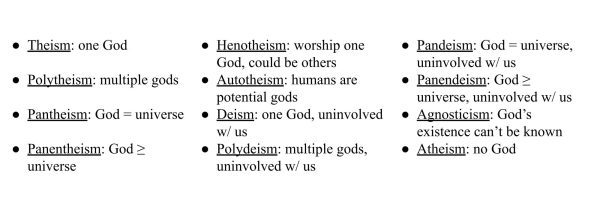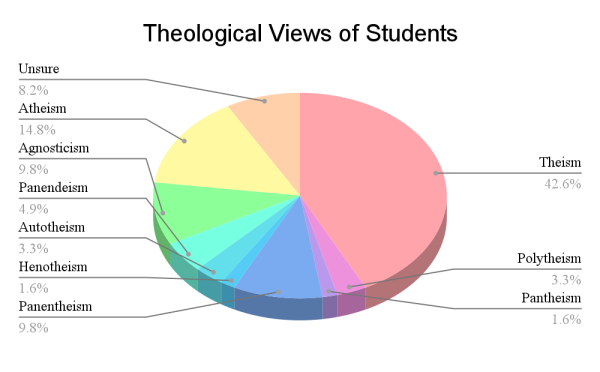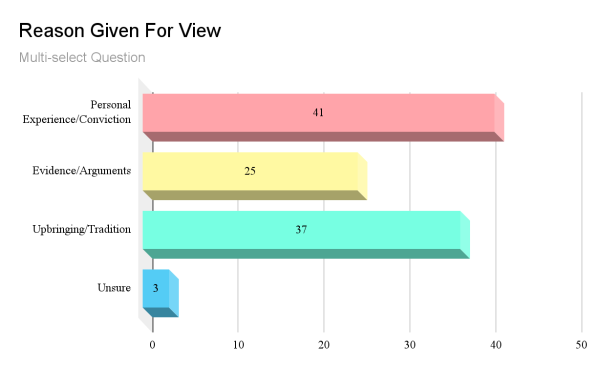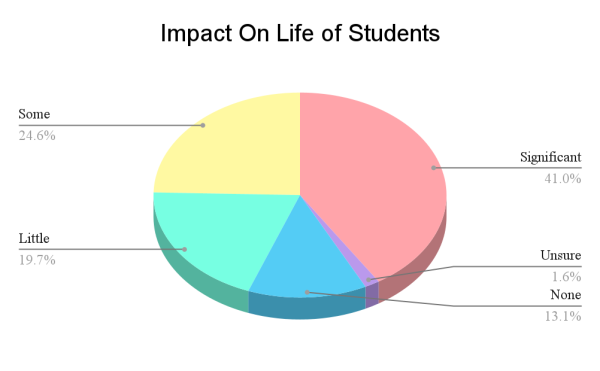What is God like? Does a higher power even exist in the first place? Does it even matter? In a recently conducted survey, students gave insight into their views on the nature of the divine.
It’s important to note that the sample size of this survey is currently not large enough for the data to be applied to the student body as a whole. Although this survey was sent out to 200 students at random, only 61 participated.


The majority of student respondents (67.2%) reported that they believe that divinity exists in some form, whether it be God, gods, or even ourselves. Within this group, the most popular view was “Theism” (42.6%), the belief in the exclusive existence of one God, typically thought of as supreme, transcendent, and perfectly good.
The remaining student respondents (32.8%) reported that they do not actively believe in the existence of anything divine. Within this group, the most popular view was “Atheism” (14.8%), which is the belief that gods or deities don’t exist.

Somewhat concerningly, “Evidence/Arguments” was the least cited reason students gave for their held belief with the most cited reason being “Personal Experience/Conviction”. Whether students are unaware of any evidence or arguments for their view, or are just uninterested in learning, is left up to speculation. Either way, it’s an unfortunate figure. It’s not that personal experiences are entirely invalid, but that they can be very subjective and difficult to verify. When accompanied by evidence or arguments of a more objective nature, however, personal experience can be extremely potent.

The majority of student respondents reported that their views on God have a “Significant” impact on their lives. Of course, one person’s significant may be another person’s little, but that’s the point. The question was intended to be subjective.
So, why does any of this matter? Well, I’d argue that our view of God is actually one of the most important aspects, if not the most important aspect, of our worldview. Our view of God has massive implications for whether or not there exists an objective meaning to life and an objective basis for morality. The most fundamental questions that virtually all people find themselves asking at one point or another–Is there a point to all of this? Is there truly something we ought to strive towards?–require us to first address the question of whether or not something transcendent exists.
Prominent atheist mathematician Bertrand Russell once said, “Science, by itself cannot, supply us with an ethic. It can show us how to achieve a given end, and it may show us that some ends cannot be achieved.”
If we weren’t created with a purpose in mind, if the world were nothing more than matter, and if we’re destined for extinction, then it would be extremely difficult, I’d argue impossible, to find anything that provides an objective meaning to life, or grounds objective moral values. However, if we were created with a purpose in mind, if there were some perfect supreme being that existed, and if mankind wasn’t doomed to a permanent death, then finding an objective meaning to life and objective moral values would actually be possible.



